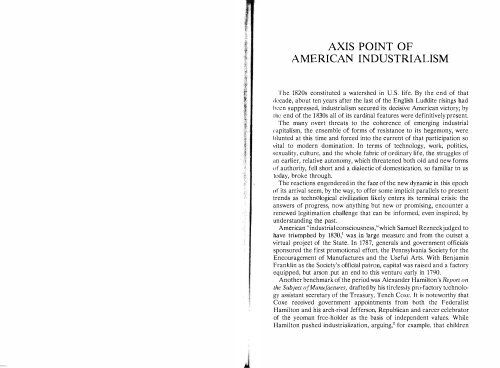CONTENTS - ouroboros ponderosa
CONTENTS - ouroboros ponderosa
CONTENTS - ouroboros ponderosa
Create successful ePaper yourself
Turn your PDF publications into a flip-book with our unique Google optimized e-Paper software.
';'<br />
AXIS POINT OF<br />
AMERICAN INDUSTRIALISM<br />
The 1820s constituted a watershed in U.S. life. By the end of that<br />
.kcade, about ten years after the last of the English Luddite risings had<br />
heen suppressed, industrialism secured its decisive American victory; by<br />
I he end of the 1830s all of its cardinal features were definitively prcscnt.<br />
The many overt thrcats to the coherence of emerging industrial<br />
capitalism, the ensemble of forms of resistance to its hegemony, were<br />
hlunted at this time and forced into the current of that participation so<br />
vital to modern domination. In terms of technology, work, politics,<br />
sexuality, culture, and the whole fabric of ordinary life, the struggles of<br />
an earlier, relative autonomy, which threatened both old and new forms<br />
of authority, fell short and a dialectic of domestication, so familiar to us<br />
today, broke through.<br />
The reactions engendered in the face of the new dynamic in this epoch<br />
of its arrival seem, by the way, to offer some implicit parallels to present<br />
trends as technOlogical civilization likely enters its terminal crisis: the<br />
answers of progress, now anything but new or promising, encounter a<br />
renewed legitimation challenge that can be informed, even inspired, by<br />
understanding the past.<br />
American "industrial consciousness," which Samuel Rezneckjudged to<br />
have triumphed by 1830,' was in large measure and from the outset a<br />
virtual project of the State. In 1787, generals and government officials<br />
sponsored the first promotional effort, the Pennsylvania Society for the<br />
Encouragement of Manufactures and the Usdul Arts. With Benjamin<br />
Franklin as the Socicty's official patron, capital was raised and a factory<br />
equipped, but arson put an end to this venture arly in 1790.<br />
Another benchmark of the period was Alexander Hamilton's Iiep0rl an<br />
the Subject afManufactures, drafted by his tirelessly pro-factory technology<br />
assistant secretary of the Treasury, Tench Coxe. It is noteworthy that<br />
Coxe received government appointments from hoth the Federalist<br />
Hamilton and his arch-rival Jefferson, Republican and career celebrator<br />
of the yeoman free-holder as the basis of independent values. While<br />
Hamilton pushed industrialization, arguing,2 for example, that children






